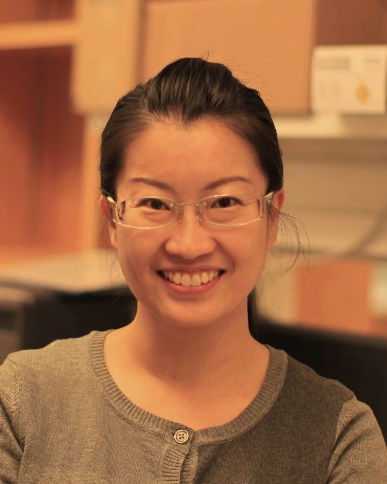Luo Min
 Min Luo,Ph.D.
Min Luo,Ph.D.
B.S. 2000, Peking University, China
Ph.D. 2005, School of life sciences, Peking University, Beijing, China
Postdoc training, 2005-2007, School of life sciences, Peking University, Beijing, China
Instructor, 2007-2010, Laboratory of Chemical Genomics, Shenzhen Graduate School of Peking University, Shenzhen, China
Associate Professor, 2010-2013, Shenzhen Center of Disease Control and Prevention, Shenzhen, China
Research Scientist, 2013-2018, Simmons Comprehensive Cancer Center, University of Texas Southwestern Medical Center, Dallas, USA
Principal Investigator, 2018-present, Institutes of Biomedical Sciences, Fudan University
Institutes of Biomedical Sciences, Fudan University, Shanghai 200032 Tel: +86 18901791977
Email: luo_min@fudan.edu.cn
Prof. Min Luo is the faculty of Institute of Biologicl Science, Fudan University. She obtianed her B.S and Ph.D. from the School of life sciences of Peking University in China, and worked in UT Southwestern Medical Center in the area of cancer vaccine development from 2013-2018. Her interest is focused on the development of immunotherapy against cancer using bioengineering methods. Her work was published in the journals including Nature Nanotechnology, Cell research, Journal For Immunotherapy of Cancer, Angrew Chem and so on.
Cancer vaccine mediated immunotherapy
Secretome protein targeted cancer immunotherapy
Checkpoint immunotherapy (e.g., pembrolizumab) has revolutionized cancer care with durable responses in patients with immunogenic tumors. However, the majority of cancer patients fail to benefit from checkpoint therapy due to inadequate cancer-specific T cell activity and highly immunosuppressive tumor microenvironment (TME). Well formulated vaccine could induce strong tumor specific T cell response, which subsequently promote the tumor rejection. The immunosuppressive heterogeneous blood cells accumulated in TME and tumor cellscollaborate in T cell suppression, promote tumor progression and therapy resistance. In this process, secretome protein-protein interactions (SPPIs) play critical roles in immunomodulation and tumor immune escape, and proteins involved in these interactions are emerging as attractive therapeutic targets. By in vitro and in vivo high-through screening on SPPIs, we study molecular mechanism in T cell and TME interactions, and identify novel targets for cancer immunotherapy. Combining cancer vaccine with targeted drugs would offer multiple innovative strategies for cancer treatment.
1. Jiang X, Wang J, Zheng X, Liu Z, Zhang X, Li Y, Wilhelm J, Sumer BD, Lea L, Lu Z*, Gao J*, Luo M*. Intratumoral administration of STING-activating nanovaccine enhances T cell immunotherapy. Journal For Immunotherapy of Cancer, 2022 May, http://dx.doi.org /10.1136/jitc-2021-003960.
2. Gu Y, Cao J, Zhang X, Gao H, Wang Y, Wang J, Jiang X, Zhang J, Shen G, Yang J, Zheng X, Xu J, Lan F, Qu D, Zhao Y, Xu G, Xie Y*, Luo M*, Lu Z* . Receptome profiling identifies KREMEN1 and ASGR1 as alternative functional receptors of SARS-CoV-2. Cell Res, 2022 Jan;32(1):24-37.
3. Li S, Luo M, Wang Z, Fu YX, Baran S, Yu H , Gao J. Prolonged activation of innate immune pathways by a polyvalent STING agonist. Nature Biomedical Engineering. 2021 May; 5(5):455-466.
4. Yin WM, Li YW, Gu YQ, Luo M*. Nanoengineered targeting strategy for cancer immunotherapy. Acta Pharmacol Sin. 2020 Jul;41(7):902-910.
5. Miller J, Luo M, ChenZJ, Gao J, Zhao T. ONM-500 – a novel STING-activating therapeutic nanovaccine platform for cancer immunotherapy. Journal For Immunotherapy of Cancer, 2020 April; 8(A7-A8).
6. Luo M, Liu ZD, Fu Yang-Xin, Gao Jinming. Synergistic STING activation by PC7A nanovaccine and ionizing radiation improves cancer immunotherapy, Journal of Controlled Release, 2019, 300:154-160.
7. Luo M., Wang H., Wang Z., Cai H., Lu Z., Huang G., Chen X., Porembka M., Frankel A, Zhijian J. Chen, Gao J. A STING-activating nanovaccine for cancer immunotherapy. Nat Nanotechnoloty. 12(7):648-654, 2017.
8. Luo M, Layla Z. Samandi, Zhaohui Wang, Zhijian J. Chen and Jinming Gao, Synthetic nanovaccines for T cell immunotherapy, Journal of Control Release. 263:200-210, 2017, (Invited review)
9. Wang Z.*, Luo M.*, Mao C., Wei Q., Zhao T., Li Y., Huang G., and Gao J. A Redox Activatable Fluorescent Sensor for the High-Throughput Quantification of Cytosolic Delivery of Macromolecules. Angew. Chem. 2017. 129:1339-1343.
10. Lu Z, Xie J, Wu G, Shen J, Collins R, Chen W, Kang X, Luo M, Zou Y, Huang LJ, Amatruda JF, Slone T, Winick N, Scherer PE, Zhang CC. Fasting selectively blocks acute lymphoblastic leukemia development via leptin receptor upregulation. Nature Medicine. 2017. 23(1): 79-90.
11. Zhao T., Huang G., Li Y., Yang S., Ramezani S., Lin Z., Wang Y., Ma X., Zeng Z., Luo M., Boer E., Xie X., Thibodeaux J., Brekken RA, Sun X., Sumer BD, Gao J. A transistor-like pH nanoprobe for tumor detection and image-guided surgery. Nature Biomed. Eng. 2016, DOI: 10.1038/s41551-016-0006.